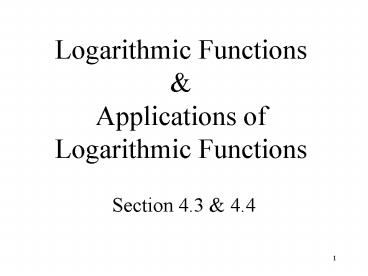Logarithmic Functions - PowerPoint PPT Presentation
1 / 24
Title:
Logarithmic Functions
Description:
Understand that logarithmic functions are ... Decibel Voltage Gain ... and EI is the input voltage, the decibel voltage gain is given by db gain = 20 log E0 ... – PowerPoint PPT presentation
Number of Views:311
Avg rating:3.0/5.0
Title: Logarithmic Functions
1
Logarithmic FunctionsApplications of
Logarithmic Functions
- Section 4.3 4.4
2
Objectives
- Understand that logarithmic functions are
inverses of exponential functions. - Change from logarithmic to exponential form and
vice versa. - Evaluate logarithms.
- Graph logarithmic functions.
- Solve real world applications involving
logarithms.
3
Earthquakes
- The Richter scale, is used for measuring the
intensity of an earthquake. For each one unit
increase on the scale the intensity is 10 times
greater. - The earthquake that killed 70 people and injured
2400 in northern California on October 17, 1989
measured 7.1 on the Richter scale. - Logarithmic formula used too measure the
intensity of an earthquake is
4
Introduction to Logarithms
- y bx is a one-to-one function, therefore, it
has an inverse. - To find the inverse switch the x and y and solve
for y. x by - To solve for y, we introduce the definition of
logarithms. (b gt 0 and b ? 1) - y log b x if and only if x by
- Conclusion
- y log b x is the inverse of y bx
5
Definition of Logarithmic Function
- The inverse function of the exponential function
with base b is called the logarithmic function
with base b. - Definition
- For xgt0 and bgt0, b?1,
- y logbx is equivalent to by x
- The function f(x) logbx is the logarithmic
function with base b
6
Location of base and exponent in exponential and
logarithmic forms
- Logarithmic form
- y log b x
- Exponential form
- by x
Exponent
Exponent
Base
Base
7
y log b x if and only if x by
- Write each equation in exponential form
- log 3 81 4
- log 7 1/49 -2
- Write each equation in logarithmic form
- 103 1000
- 4-2 1/16
8
Find y in each equation.
- log 2 8 y
- log 5 1 y
- 25
9
Find a in each equation
- log a 36 2
- log 8 a -1/3
10
Graphs of Logarithmic Functions
- Graph
- y log 2 x
11
Graphs of Logarithmic Functions
- Graph
- y log 1/2 x
12
y log b x has the following properties
- Domain (0, ?) , Range (- ?, ?)
- It passes through the point (1,0)
- It passes through the point (b, 1)
- The y- axis is an asymptote.
- If b gt 1, it is an increasing function
- If 0 lt b lt 1 , it is a decreasing function
13
Transformations Involving Logarithmic Functions
14
Translations
- Graph y log 1/3 (x 2)
- Graph y log2 x - 1
15
Base 10 logarithms
- Called common logarithms
- When base b is not indicated, it is understood
that b 10 - log 1/100 log 10
- log 1/10 log 100
- log 1 log 1000
16
Logarithms involving base -e
- log e x means ln x
- These are called natural logarithms
- y ln x is the inverse of y ex
- The domain of y ln x is (0, ?)
- The range is the interval (-?, ?)
17
Solve each equation
Simplify using a calculator
- ln 17.31
- ln(log 1/3)
- ln x 1.9344
- log x ln 3.2
18
Graph y ln x y ln(3x)
19
Decibel Voltage Gain
- If E0 is the output voltage of a device and EI is
the input voltage, the decibel voltage gain is
given by db gain 20 log E0 - EI
- Find the db gain of an amplifier if its input is
0.7 volt and its output is 40 volts.
20
Richter Scale
- If R is the intensity of an earthquake, A is the
amplitude (measured in micrometers), and P is the
period ( the time of one oscillation of the
earths surface, measured in seconds), then - Find the intensity of an aftershock with a period
of 0.07 and an amplitude of 2500 micrometers.
21
Charging Batteries
- If M is the theoretical maximum charge that a
battery can hold and k is a positive constant
that depends on the battery and the charger, then
C M(l e-kt) - How long will it take to bring a battery to 90
of full charge? Assume that k 0.025
22
Population Growth
- The time required for the population to double is
called doubling time. - If r is the annual rate and t is the time
required for a population to double, then - The population of the earth is growing at
approximately 2 per year. If this rate
continues when will the population double.
23
Isothermal Expansion
- If the temperature T is constant, the energy E
required to increase the volume of one mole of
gas from an initial volume Vi to a final volume
Vf is given by - E is measured in joules and T in degrees Kelvin
and R is the universal gas constant 8.314
joules/mol/K.
24
Find the amount of energy that must be supplied
to double the volume of 1 mole of gas at a
constant temperature of 300K.































